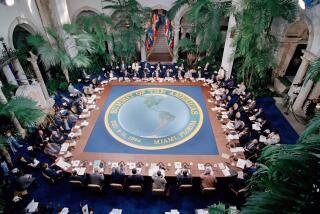A Proper Offer
- Share via
Mikhail S. Gorbachev, the new Soviet leader, may find it impossible--or at least impolitic at home--to drop his new duties and agree right away to President Reagan’s proposal for a summit meeting. But making the offer was the right thing for the President to do.
Reagan has obvious reasons to want a summit with Gorbachev. He is sensitive to the fact that he is the first President since Herbert Hoover not to meet at least once with his opposite number in the Kremlin. But there are more substantive reasons for the two to talk.
U.S.-Soviet relations show signs of emerging from the shadows of great stress and strain. It is important that small improvements in relations broaden into nuclear-arms reduction and less confrontational relations generally.
This will require realistic, flexible approaches from Moscow as well as from Washington. And it remains to be seen whether Gorbachev’s elevation will lead to more realism and flexibility in Soviet policies at home and abroad. As Henry A. Kissinger commented on Wednesday, “You don’t get to be head of the Politburo by being a choir boy.” Even if Gorbachev has benign intentions, he must win over colleagues in the Politburo to major shifts in policy.
Reagan’s advisers emphasize that the President is not hell-bent for a summit, but wants merely to open the door to a meeting if the Soviets are interested. Some American experts suspect that, while Gorbachev himself might welcome an early big-power summit in order to build his credentials as a world leader, his Politburo colleagues will be unsure that such a meeting would be to Soviet advantage at this time.
Nevertheless, it just may be that the change in leadership does open a window of opportunity for important improvements in East-West relations. Certainly we ought to find out. The Administration is right in moving to exploit whatever opportunity exists before the new Soviet leader’s policies are set firmly in place--possibly as early as next fall.
At that time the Communist Party of the Soviet Union will adopt a new five-year plan setting economic priorities. It will also adopt an ideological framework for both domestic and foreign policy for several years to come.
But no summit meeting should ever be an end in itself; summits can do more harm than good if they lead to unrealistic hopes and expectations that are then dashed. Within that context it is hard to see how a Reagan-Gorbachev summit, complete with treaties to sign or important agreements to announce, can occur until the two sides make some visible progress in bridging the great differences that divide them.
Even a brief, get-acquainted summit could be as risky as any blind date. Reports from Washington say that Reagan and Politburo member Vladimir V. Shcherbitsky did not hit if off well in their recent White House meeting. There can be no guarantee that a Reagan-Gorbachev encounter would go any better.
Still, a brief meeting with a limited agenda that would not raise hopes too high would give each man the benefit of personal contact with the other--and could give arms and other negotiations an added sense of purpose and energy--without running the degree of risk that a major summit would involve. Such a meeting might also be easier for Gorbachev to fit into his schedule and to sell to doubting Politburo colleagues.
The best opportunity for a summit of that limited scope would come during Reagan’s swing through Europe next month. The Administration should sound out the Soviets on this point--and, if the response is positive, rearrange the President’s schedule accordingly.
If the timing is wrong from the Soviet point of view, Reagan at least has demonstrated the American interest in contacts at the highest level to help along the process of negotiation and accommodation. That itself is a plus.
More to Read
Get the L.A. Times Politics newsletter
Deeply reported insights into legislation, politics and policy from Sacramento, Washington and beyond. In your inbox three times per week.
You may occasionally receive promotional content from the Los Angeles Times.









